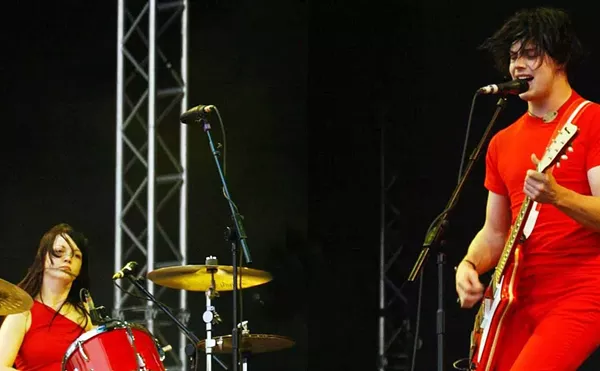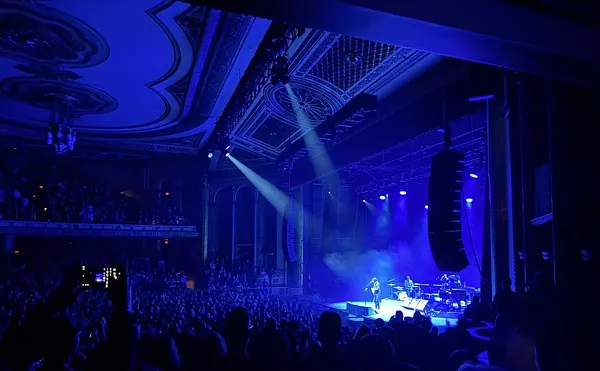
Audio By Carbonatix
[
{
"name": "GPT - Leaderboard - Inline - Content",
"component": "35519556",
"insertPoint": "5th",
"startingPoint": "3",
"requiredCountToDisplay": "3",
"maxInsertions": 100,
"adList": [
{
"adPreset": "LeaderboardInline"
}
]
}
]
Martín Perna is what you would call an idea man — a mix of idealism and verve. To paraphrase Robert Kennedy: Some people see things as they are and wonder why; Perna is one of those who dream of things that never were and say, why not?
“My process is to see something that needs to get done that I believe in and feel passion about and try to have that sense of optimism. It could even be naive optimism — a lot of times it is, but I just do it, regardless of the obstacles,” says Perna over the phone from his New York City home.
In the fall of 1997, while in a Mexico City hotel room, Perna conceived of Antibalas (Spanish for “anti-bullets” or “bulletproof”), an Afro-beat orchestra dedicated to upholding the tradition of Fela Kuti’s music, and spreading a message of love and reunification. Kuti had just died a few months earlier, and Perna recognized the absence of anyone in America following in his footsteps. Though he was just out of college, only 22 and a relatively inexperienced musician, he had a vision and he followed it.
Like Bob Marley, Kuti’s music derived its power both from the native rhythms and the political nature of his lyrics. But where Marley was a pop star, Kuti was a true cultural rebel persecuted by the Nigerian government, whose soldiers attacked his studio-compound in 1977, resulting in a fractured skull and the death of his mother. But Kuti continued to deliver his blistering rhythmic orchestrations and rhetoric until his death, forging, it’s safe to say, one of the greatest African musical legacies.
“Afro-beat is a musical idiom, just like the blues or son or gospel music, so there are certain musical conventions. It’s a West African music that has been influenced by African music that originated in North America such as soul and jazz, as well as being influenced by a lot of Nigerian traditional music and rhythms,” says Perna. “A big horn section is out front in most of the songs and is supported by a heavy rhythm section and three to five percussionists. There’s lots of group singing, call-and-response with the audience. It’s sweaty, sensual, angry, hopeful and joyful all at the same time.”
Perna started small, gathering a group of seven players for Antibalas’ first performance in 1998. Though intimidated at first by their skills and knowledge, Perna soon recruited members of deep funk revivalists Soul Providers, Afro-beat peers The Daktaris and the ska band King Changó, and Antibalas grew to as many as 17 members. Though their first album, Liberation Afrobeat, Vol. I, was criticized for slavishly aping Kuti, each of the subsequent two albums has brought their mix of Afro-beat, funk and Latin rhythms into greater balance, culminating with their newest, and most overtly political album, Who Is This America?
The album opens with “Who Is This America Dem Speak of Today?” Singer Amayo adopts a syncopated delivery reminiscent of jazz scat, questioning the multi-ethnic basis of our heritage (“Is it indigenous … is him original America?”) and our consumerist tendencies (“Him who buying Nike, him who watching TV, I must ask again, who is this America?”) over furious rhythms, abetted by a Greek-style chorus repeating the question over and over again. “Indictment” features trilling contrapuntal horns over a dub-style beat, echoed in the bass and guitars and driven by a jazzy solo. The song breaks with the sound of banging on a door, like cops arriving for an arrest, followed by the sound of a gavel and indictments leveled at Donald Rumsfield, Condoleezza Rice, John Ashcroft and George W. Bush for their crimes against humanity, before the music roars back over what sounds like an uprising that is mirrored in the angry rhythms.
“This is the first record that we really decided to embrace the studio — and see what we can do in the studio that we can’t do live,” says Perna. “You see that in the dub elements. Our keyboardist Vincent Axelrod had a bit more creative input on the production side of things and his forte in the past has mostly been in the reggae and dub world. So there’s a little bit of that flavor too, using dub and the studio to expand and fortify the inherent psychedelica of Afro-beat.”
The album’s high point is “Big Man,” a rumbling rhythmic extravaganza fueled by toms and bubbling African rhythms that grows in full-fledged funk workout, thanking the “big man” for all he’s done for the little man. Perna explains that the tune was the first for which the lyrics were written as cooperative.
“We just sort of started brainstorming on the idea of ‘Big Man,’ and we came up with the idea of a sort of sarcastic ‘thanks for nothing.’ Because the government and the money they have — it comes from us, and the sweat of each of our brows every day,” says Perna. “And none of this money is coming back to us, it’s coming back to bite us — we’re being oppressed or ripped off, poisoned and polluted, and that same money is used to do the same thing to other people in other places.”
But Perna’s horizons extend beyond musical rabble-rousing. He’s working on a book on DJs (“What is it about their artistic process that they’re able to move these audiences in a way that previously only bands could?”) and is engaged in a number of community outreach projects. One of these found him going down to Mexico to teach a “super adobe” building technique he’d learned while apprenticing under Iranian architect Nader Khalili in the fall of 2002. He employed children ages 6 to 16, teaching them the technique as they initiated the construction of a building that will eventually serve as a tamascal (a native Mexican vapor bath). Perna drove there and back in a diesel Mercedes station wagon running on vegetable oil he culled from restaurants along the way.
“The oil industry is the greatest unnecessary evil in the world,” Perna says. “It’s simply a matter of expanding the production of vegetables that are grown for oil, which America or any country could do. It’s really just returning to the original purpose of the diesel engine, because when it was debuted to the world it was running on peanut oil … and America deep-fries a lot of food.”
While he was gone, the band continued without him. Far from being offended, Perna is quite proud of the fact.
“A baseball team may have nine players on the field, but they’ve got seven players who know all the plays that are in the dugout. It’s the same with us. And a lot of times it’s the reserves that end up hitting the home runs, because everybody in the group is a major league player, and there are no stars,” Perna says. “I might not be around, but it doesn’t really matter because they already have the ball and they’re running with it. I may have started Antibalas, but it has a life well beyond me, and I wouldn’t have it any other way. That’s the most exciting thing — to see all these different people coming up, shining, writing and making it theirs.”
Antibalas Afrobeat Orchestra appears at the Magic Bag (22920 Woodward Ave., Ferndale) on Wednesday, June 9. Call 248-544-3030 for info.
Chris Parker is a freelance writer. E-mail letters@metrotimes.com




